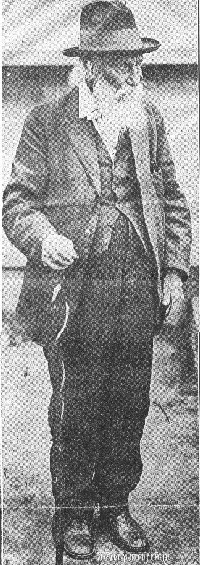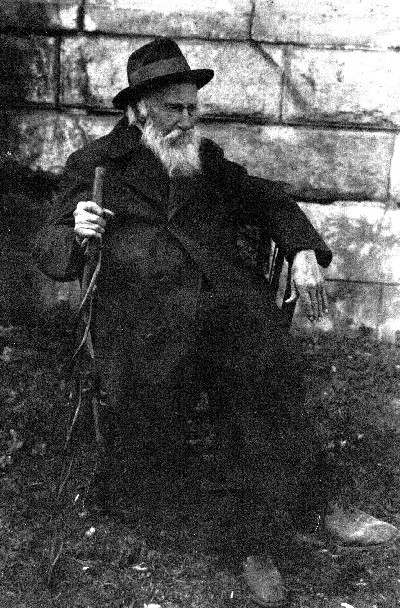The following article appeared in “The Commercial Appeal”, Memphis, Tennessee, Sunday, 2 April 1922.
“UNCLE CHARLIE THOMPSON, Aged 94 Travels Alone, WAS CIVIL WAR SCOUT.
Veteran Surveyor of Wayne County, Tenn. Visits This City for First Time Since 1864 – “Good Gracious! How Town Has Changed,” He Said.
By J. H. CURTIS
 “Good gracious, how this town has grown since 1864,” said “Uncle” Charlie THOMPSON, of Lutts, Tenn., as he stood, hat in one hand, cane in the other, and gazed over the city from the window on the third floor of the Federal building.
“Good gracious, how this town has grown since 1864,” said “Uncle” Charlie THOMPSON, of Lutts, Tenn., as he stood, hat in one hand, cane in the other, and gazed over the city from the window on the third floor of the Federal building.
“Why, they have cut the bluffs away. The steamboat landing seems to have dropped out of sight. The business part of the city has consolidated with Fort Pickering, and Main Street has ceased to be a mud road. Its all so wonderful, I just can’t find myself.”
Then he turned and walked briskly downstairs to the offices of his friend, C. C. HINKLE, U.S. collector of customs, whose guest he was for two days.
Every body in Wayne County, Tenn. boats of a personal acquaintance with C. M. THOMPSON. They know him as “Uncle Charlie”. He is living today in the same house he moved into when two years old. If he lived until April 15, this year, he will be 94 years old. He was born within four miles of his present home in Lutts, Tenn., a village on Rutherford creek.
Recalls First Memphis Visit
“My first visit to Memphis was in company with some immigrants to Arkansas,” said “Uncle Charlie, taking a scat in Mr. HINKLE’S office chair. “That was in 1845. I did not stay long. The streets were muddy, the town was not promising to me. In fact, I loved the hills and creeks back in Wayne County, so after taking in the sights of Memphis, I drove my team back home.”
“The next time I was in Memphis was in 1859. There was some changes of course. The town was divided. I was told of Fort Pickering on the south, of its advantages and promises. I had some money and was told this might be a good place to invest it, but again my high, green hills of Wayne County appealed to me and I went home.
“It was on my second visit that I saw workmen grading away Wright’s Bluff. I thought ti a shame to spoil nature with men and shovels, but I suppose it was in the making of a great city and had to be.
“My third visit to Memphis was in 1864. I as stationed at Paducah, KY, as a special representative of the United States treasury, and came to this city on business, with Gen. ORRD, the provost marshal.”
Mr. THOMPSON served as a scout for the Federal forces during the Civil War. He was attached, considerable of his time, to the command of Gen. DODGE, and he boasts of having been in that commander’s confidence to the very limit of trust placed in him.
“Gen. DODGE was a great man. That is my way of thinking of him. He had a big heart and generally did the right thing for all the people, but he was a fighter and a good commander.”
Saw Sherman Almost Captured
“By the way, after the fall of Vicksburg, I was near Collierville when Gen. SHERMAN and staff were moving east. Gen. CHALMERS of the Confederate forces made a sudden dash into Collierville the morning Gen. SHERMAN was there and almost captured him. His men got away with SHERMAN’s _____[page torn] horse and the General himself barely excaped by climbing on a train. Gen. CHALMERS worked quick. None of us knew there was a Confederate force anywhere about. Gen. SHERMAN was sauntering about near the train when some of his men gave the alarm, but they were on us before a man could fire a gun.
“The act of Gen. CHALMERS was so brave, quick and daring, it took the breath away from Gen. SHERMAN’s staff for a few seconds, and by the time they awoke to the situation the Confederates had gotten away, although the bullets flew after them. No one was burt and after the excitement, Gen. SHERMAN had a good laugh. Turning to me he said he wanted that borse back. But I had no time hunting a horse with Gen. CHAMLER’s men so close at hand. I left the vicinity of Collierville on the first train over the Memphis & Charleston railroad that followed Gen. SHERMAN.
Saw Sam Davis
“I was with Gen. DODGE at Pulaski, Tenn. I knew Sam DAVIS had been captured by federal forces. I knew what charge had been placed against him. I did not know he had been sentenced, but I saw him between guards going to be hanged on a court martial charge of being a Confederate spy.
“They passed close enough for me to have touched Sam DAVIS. I looked him in the face. It was the first time I had ever seen him, but his brave act had spread about the camp and he had the sympathy of every Federal soldier there.
“He was a young man, I judged about 24 or 25 years old. I went about my work and in a few minutes I me up with Capt. CHEEK of the Federal army and he told me they had hung DAVIS.
“I was shocked. If I had known that morning he was to be executed, I would have gone to Gen. DODGE in his behalf. I am quite sure my pleadings would have saved him. Gen. DODGE did not want to hang DAVIS. He expressed himself to me afterwards that it was the one regret in his life, but DAVIS refused to tell where he had gotten plans of the army at Pulaski. Gen. DODGE was confident they were given him by an officer in his command.”
Mr. THOMPSON is hale and hearty at his age of almost 94. He boats that he has been a dram drinker all his life, chewed and smoked tobacco and has found none of the defects of it as laid down by modern science.
“That recalls a conversation I had some months ago with friends of mine. They asked me how I had managed to live so many years.
“Well, I told them, here are two neighbors, each younger than I. One of them has followed a temperate life. He never used tobacco, never drank coffee, or whiskey, and has been at home all the time. Now he is dead.
“I have no advice to give on how to live a long time. I have been exposed to all sorts of weather during my life. I was in the war almost four years. Every man who fought in the Civil War can tell of the hardships endured, whether he was a Federal of Confederate. They were brace men on both sides. It’s just the way a fellow treats his body I guess, that brings on a long life. I know of nothing else to cause it.”
Mr. THOMPSON says he was the first person other than a soldier to have been on the battlefield of Shiloh. It was the first morning after the battle had ended that he went down there from Savannah, Tenn.
“It was a terrible battle. It went through me like a piece of cold steel when I stood in the midst of the ground over which the men had fought.
Says Markers Are Wrong
“I have seen the battlefield after its reconstruction. The monument built to the memory of Gen. Albert Sydney JOHNSTON is 50 yards out of line. It was not there that the great Confederate general received his wound or it is not on the spot where he died. There are many other markers out of line on that battle field as it appeared to me the morning I walked over it when the carnage was fresh. It made an everlasting impression on me. I cannot forget it as long as I live.
“We hear a good deal these times about Bob and Alf TAYLOR. Poor Bob, he was a great man in his life. But I think Alf the best politician we have. He was always a good fellow, well met. Those boys could tell a lot of rattling stories but none of them were as good as those told my their father Nat TAYLOR. I knew the whole family.”
There is another thing Mr. THOMPSON boasts of. He has been a member of the Masonic lodge for more than a half a century. He was a surveyor of Wayne County for more than 50 years and has always taken an active part in state politics.
Mr. THOMPSON’s eldest child is Mrs. Nancy M. FARRIS. She lived with him in Lutts, Tenn. He has a son, Z. J. THOMPSON, who is attorney, residing in Okemah, Okla., and a son, Will THOMPSON, a physician in Pontotoc County, Miss.
“I’m going to live to be 100 years old. I am coming back to Memphis that year and celebrate my anniversary,” he said, walking actively about Mr. HINKLE’s office.
Resuming his seat he tilted the chair back. “I came home after the war with no regrets. I am proud of the fact that I never killed a man in the war. I never did any person a harm that I know of, and I have always out as close as I knew how, the ‘Golden Rule’.”

